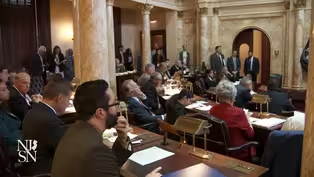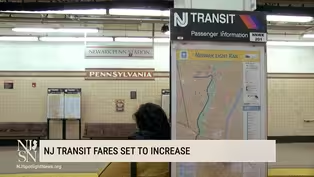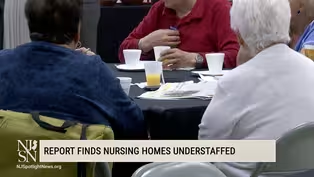NJ Spotlight News
AG Platkin slaps NJ's use of opioid settlement
Clip: 6/30/2025 | 9m 22sVideo has Closed Captions
Interview: New Jersey Attorney General Matt Platkin
Tucked away in the state's massive $58.8 billion budget bill is a last-minute proposal that is sparking uproar from community groups -- and the state's own attorney general.
Problems playing video? | Closed Captioning Feedback
Problems playing video? | Closed Captioning Feedback
NJ Spotlight News is a local public television program presented by THIRTEEN PBS
NJ Spotlight News
AG Platkin slaps NJ's use of opioid settlement
Clip: 6/30/2025 | 9m 22sVideo has Closed Captions
Tucked away in the state's massive $58.8 billion budget bill is a last-minute proposal that is sparking uproar from community groups -- and the state's own attorney general.
Problems playing video? | Closed Captioning Feedback
How to Watch NJ Spotlight News
NJ Spotlight News is available to stream on pbs.org and the free PBS App, available on iPhone, Apple TV, Android TV, Android smartphones, Amazon Fire TV, Amazon Fire Tablet, Roku, Samsung Smart TV, and Vizio.
Providing Support for PBS.org
Learn Moreabout PBS online sponsorshipTucked away in that massive budget bill is a proposal that sparked major uproar from community groups all the way to the Attorney General's office.
It calls for diverting $45 million in opioid settlement funds into the coffers of four hospital systems in New Jersey, money that advocates say should be going directly to groups that treat people struggling with drug and alcohol abuse.
Harm reduction workers point out they didn't learn about the change until this weekend, and the language diverts the money with no strings attached or requirement that the hospitals need to account for how it's spent.
The proposal calls for sending $15 million each to RWJBarnabas Health and Cooper University Hospital, $10 million to Hackensack University Medical Center, and $5 million to Atlantic Health System.
Just weeks ago, the state's Opioid Recovery and Remediation Advisory Council laid out recommendations for where the money should go with a focus on community-based groups.
Well, the New Jersey Hospital Association defended the decision, arguing that hospitals have been on the front lines of the opioid crisis.
Attorney General Matt Plotkin, though, compared it to mistakes the state made in the past diverting tobacco settlement funds.
I asked him about that earlier today, along with his take on the U.S. Supreme Court's ruling in the birthright citizenship case, in which he helped lead the challenge.
Attorney General, thanks for your time.
Before we get into this issue with the Supreme Court ruling, I want to talk about a more local matter.
The budget, as it's being proposed, calls for diverting some of this opioid settlement money.
Your reaction to that, because your office oversaw a report from the Recovery Advisory Panel that basically said this money should be in the hands of folks who are on the streets doing this work.
Yeah, look, as a general matter, I typically defer to the legislative process and the budget.
But when it comes to these dollars, which my office for years fought against companies that profited off of the opioid epidemic and brought back hundreds and hundreds of millions of dollars, that by the terms of the settlement and by the terms of a law passed by the legislature and signed by the governor, are supposed to go to evidence-based solutions to the epidemic.
And the council is supposed to be the body that makes the recommendations for how the state will spend its share.
And again, this is an epidemic that continues to take the lives of thousands of New Jerseyans every year.
And I just can't stand idly by and watch us spend this money outside of the process that we all agreed to in a way that reminds me of what we did a few decades ago with the Tobacco Settlement Fund dollars, which were diverted away from their intended purpose and something we're still dealing with the consequences of.
So I don't take any issue with hospitals getting funding.
I understand they're stretched thin right now.
But these dollars are supposed to go to best practices to combat the opioid epidemic and nothing else.
What oversight, if any, will you leverage then, if this money does end up going into their coffers, those hospitals, to determine that it's being spent on these efforts?
Well, we're going to make sure if this funding goes forward as proposed, that the hospitals that receive it are spending it in ways that are consistent with the settlements.
Again, on best practices to support vulnerable populations struggling with addiction.
I think we all know folks or their families who are dealing with this devastating epidemic.
And my number one priority through these settlements is to get them relief.
That's it.
Attorney General, let me switch gears.
I know that we've been talking quite a bit here and you have as well about this decision from the Supreme Court.
You have said publicly that you feel confident that the lawsuit that you brought, along with other attorneys general, will be successful in getting a nationwide injunction on the birthright citizenship issue.
Why are you so confident to that end?
Well, I think it's important to note what the Supreme Court did not do last Friday.
It did not apply on the merits of birthright citizenship, again, because the merits of this debate are very clear.
They were settled 157 years ago after the Civil War when we said as a nation, never again will we debate whether babies born on U.S. soil are in fact citizens.
And the second thing they didn't do is they didn't say states can't get nationwide relief.
What they said is we just need to show that we can't alleviate all of our harms as states without nationwide relief.
And the reason why we haven't shown that is because when we were at the court, the trial court the first time, the federal government didn't put forth any argument that they had an alternative to a nationwide citizenship process.
They never said there are alternatives to how we could treat people born in Philadelphia different than people treated or treat people differently than those born in New Jersey.
And of course, the administrative and just significant challenges that would flow from doing that are extraordinary.
And we'll be I'm confident we'll be able to meet the standard laid out by the Supreme Court.
And I would just note, thanks to the decision we got on Friday, but this was evident even before that, I don't think it's ever been more important who the state attorney general is, because now with nationwide injunctions severely limited and with states really the only bodies that can go in and get nationwide relief, in many cases, your rights and privileges or the funding we receive as a state will be dependent on who your attorney general is.
And that is a significant change in how we have functioned as a nation.
If we do end up with a patchwork system, which is what some of the critics of this decision have said could happen, is there a scenario in which you see New Jersey being sort of a sanctuary or a haven for folks who are undocumented, who are delivering their babies?
Is that something that's even within the framework of your mind right now?
Or are you just focused on the next set of court hearings?
I don't think it's my job to tell the federal administration how they can administer or how we would administer a blatantly unconstitutional order.
They have to come to court.
They have to explain how somebody who lives in New Jersey but happens to be in Pennsylvania when they go into labor, how that child is treated differently than if they had been at home in their house in New Jersey when they gave birth.
We have not treated people differently in terms of their citizenship status based on the state they reside in since slavery existed before the Civil War.
I don't think anybody seriously thinks we want to go back to that type of America.
And let's be clear, for states, New Jersey is a great example.
People cross state lines to give birth.
People move.
So if a child is born in Pennsylvania and then their family moves into New Jersey, are we really supposed to have to parse through whether that child at the time of his birth was a citizen or not a citizen, who their attorney general was, and try to decipher what types of benefits they're entitled to?
I mean, it's absurd.
It's why we have the 14th Amendment.
That's why I'm confident that we'll prevail.
Is that why you feel that you'll be successful in terms of arguing the point that that's why nationwide relief in particular is needed?
I mean, you may have seen the interview Attorney General Pam Bondi did last week when she was asked this exact question.
How will you administer a system of citizenship by states?
And it was just deer in the headlights.
It's like they didn't even think when they issued this unconstitutional order on day one how they would possibly administer it.
And so there is no good answer for how we would do this.
And we haven't done anything.
I wonder though, Attorney General, if I can jump in on that, if that was part of the strategy, that maybe this administration never actually intended on seeing an end to birthright citizenship, but a really smart legal maneuver to get rid of these nationwide injunctions, which you know, and I know administrations on both sides of the aisle have taken issue with.
And look, I share concern about nationwide injunctions.
Generally, we've always said they should be limited.
Even in our argument where Solicitor General Jeremy Feigenbaum argued at the United States Supreme Court, we said these are reserved for limited circumstances.
But one is clearly when we're talking about the interpretation of an amendment that provides citizenship to babies born on U.S. soil, impossible to administer differently in different states.
And so again, I'm confident, in fact, nobody seriously thinks we're wrong on the merits.
And I'm confident that the reason why the Supreme Court left the door open and froze everything for 30 more days so that we could go to court and make our arguments, I'm confident we'll get the relief we're seeking.
And ultimately, I'm confident that we will prevail on the merits in this case.
Attorney General Matt Plotkin, thanks for your time.
We appreciate it.
Thanks for having me.
[MUSIC PLAYING]
NJ crisis nursery: A safe haven for children
Video has Closed Captions
Clip: 7/7/2025 | 4m 50s | Monmouth County center provides free, emergency childcare (4m 50s)
NJ Senate OKs budget, tax hikes
Video has Closed Captions
Clip: 6/30/2025 | 5m 42s | Assembly debate continued on Monday evening (5m 42s)
NJ Transit fares to go up by 3% on July 1
Video has Closed Captions
Clip: 6/30/2025 | 1m 2s | The fare hike is the first of what could become annual 3% increases (1m 2s)
Three NJ nursing homes ordered to pay back Medicaid
Video has Closed Captions
Clip: 6/30/2025 | 1m 31s | Office of the State Comptroller threatens to withhold portion of future Medicaid funds (1m 31s)
Providing Support for PBS.org
Learn Moreabout PBS online sponsorship
- News and Public Affairs

Top journalists deliver compelling original analysis of the hour's headlines.

- News and Public Affairs

FRONTLINE is investigative journalism that questions, explains and changes our world.












Support for PBS provided by:
NJ Spotlight News is a local public television program presented by THIRTEEN PBS



